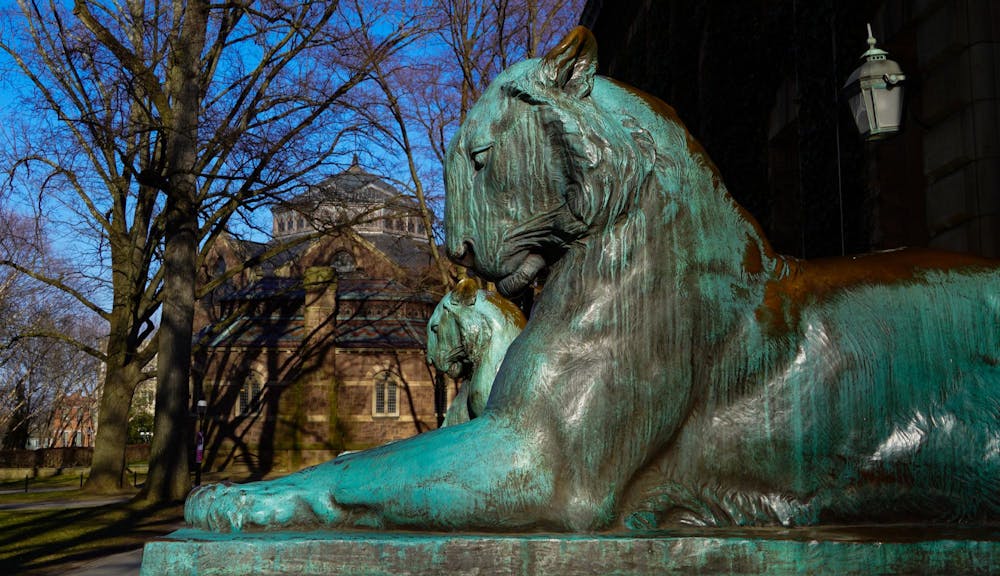President Christopher Eisgruber ’83 shared in an interview with The Daily Princetonian that the University will not consider institutional neutrality. The University administration will maintain the current policy of institutional restraint although Eisgruber expressed plans to issue statements “less frequently.”
Under institutional neutrality, universities do not take positions on social and political issues. Peer institutions such as the University of Pennsylvania, Harvard University, and Cornell University have recently released statements pledging commitments to furthering institutional neutrality following highly polarizing Pro-Palestine protests in the spring semester.
“No.” Eisgruber responded when asked if the University is considering implementing institutional neutrality.
“You can’t be neutral about everything,” Eisgruber continued. He specifically noted speaking on behalf of diversity, inclusivity, free speech, academic freedom, and sustainability. “We got to do it … We’re speaking out on behalf of those things. So I think institutional neutrality is just a misleading formulation.”
This selective approach to issuing statements is called institutional restraint, the principle that universities are not neutral but instead value-laden institutions that can take positions in rare cases concerning the core values of the University.
“We have to stand up for our values … I’ve spoken, and will continue to speak boldly for those values, where that’s required, for the institution, and at times beyond the way in which other university presidents are doing that,” Eisgruber said in defense of maintaining institutional restraint.
Still, on certain topics, Eisgruber believes he has an “institutional responsibility” not to speak out.
“Something I share with the people who embrace the idea of institutional neutrality [is that] the University is first and foremost, not itself the critic. It’s the sponsor of critics,” Eisgruber said.
He specifically referenced the Dobbs v. Jackson decision reversing Roe v. Wade as a moment when he felt he should not speak out, despite his expertise in law and other university presidents doing so.
Despite holding back on certain issues, Eisgruber has issued statements on current events to recognize their “momentous character” and “the way in which they are affecting people on campus.” Recent examples include statements on the War in Ukraine and a condemnation of the Oct. 7 attacks by Hamas. In these statements, Eisgruber shared that he makes sure to use the first person.
The University has also taken actions which would be considered violations of institutional neutrality, most notably divestments from South Africa and companies in Sudan and partial divestment from the fossil fuels sector during Eisgruber’s presidency. Eisgruber pointed out that the University of Chicago, which created and follows the Kalven Report, a guideline to institutional neutrality, never divested from South Africa.
In a speech during first-year orientation, Eisgruber indicated a desire to practice even further restraint. “I have rarely made statements in the past and plan to do so even less frequently in the future,” he said to the crowd.

When asked how he came to this decision, Eisgruber said determining which issues to comment on is difficult. “If we comment on those kinds of things that are in the news, we’re constantly doing this calibration. Do I comment on this event or on that event? How do we get it right?” he said.
He further believes that living in a “highly polarized world” lends itself to recognizing the pragmatic reasons to abstain from certain statements.
Instead, in line with the philosophy of the University being the “sponsor of critics,” Eisgruber said, “There’s more reason just to leave the comments about current events, in particular to our faculty and our students.”
“I have spoken out more, in retrospect, than I would say makes sense for the future,” Eisgruber said in the interview.
Eisgruber shared that this further restraint will take shape in reduced email messages and blog posts in response to current events, although he will continue to “look for ways to speak through what are, in some sense, traditional, long form presidential ways of speaking to issues.”
Eisgruber’s direct rejection of consideration of institutional neutrality differs from peer institutions such as Yale University, which recently set up a committee to consider the policy.
The debate around institutional neutrality is not new. In 2021, following urges from professors, especially conservatives and free speech advocates, to adopt the policy, Eisgruber tasked a subcommittee within the Faculty Advisory Committee on Policy with considering statement-making by units of the University. The committee's policy recommendation aligned with institutional restraint.
Eisgruber noted that due to the ease of distributing statements digitally, there is sometimes an expectation for statements from him, an expectation he must navigate. For example, in Spring 2022, hundreds of students signed an open letter urging the University to take a public stance on the War in Ukraine, including students from the region.
The University will keep navigating these pressures while maintaining its historic ability to issue statements when its values are challenged.
“Princeton has a broader history which is important to us, where we have recognized that in rare sets of circumstances, the University actually takes positions,” Eisgruber said.
Bridget O’Neill is a head News editor for the ‘Prince’ from Palm Beach Gardens, Fla.
Please send corrections to corrections[at]dailyprincetonian.com.








